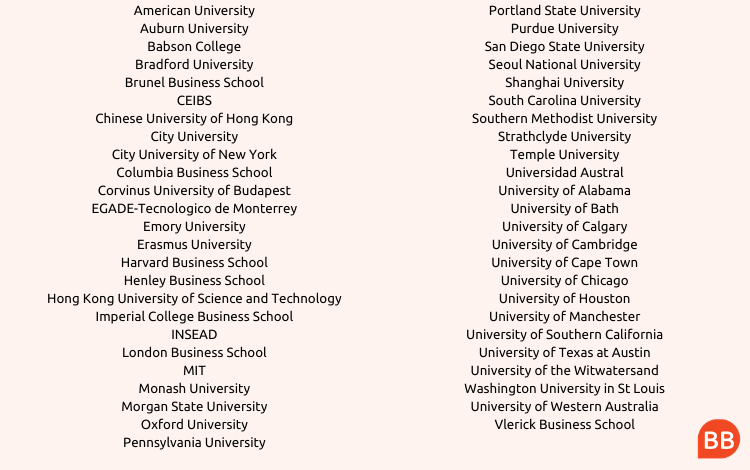To say COVID-19 has disrupted graduate management education is an understatement. Schools last year were forced to move most programs online; graduate career prospects were disrupted by a poor jobs market and reduced mobility; and students complained tuition no longer reflected value.
Now the pandemic has hit another aspect of business education: MBA rankings. A new survey by educational services company, Kaplan, has revealed fewer than a third (28%) of US business schools plan to participate in all MBA rankings in 2021.
Kaplan surveyed admissions officers from 90 full-time business schools across the US late last year. Among them were 14 of the top 50 programs in the US, as ranked by US News & World Report. Of the schools polled, 62% said they plan to participate in some MBA rankings in 2021; 10% said they don’t plan to participate in any.
Reluctance to participate in rankings this year is a stance shared by schools globally. 62 of the world’s best business schools were missing from the Economist MBA ranking released in January 2020. The schools missing were either ineligible or declined to participate, or they chose not to survey their alumni and students .
The absentees included Harvard Business School, Stanford, Wharton, London Business School, INSEAD, and both the UK’s Oxford Saïd Business School and Cambridge Judge Business School among others.
Schools missing from the Economist's MBA Ranking 2021

Why are business schools rejecting MBA rankings?
The majority of business schools have added a layer of flexibility to their admissions process to help deal with the fallout from the pandemic. This includes making the GMAT or GRE optional. A school’s incoming cohort’s average test score is a key data point in many MBA rankings, and so waiving test scores would likely alter a school’s position in the ranking.
As the economy has been hit hard too, it’s likely that many schools found it challenging to boast employment and job placement figures as impressive as previous years. Salary increase post-MBA is weighted heavily in some rankings—like the Financial Times—and so as companies feel the economic squeeze and either hire fewer graduates or hire them on lower salaries, schools may be reluctant to report the figures.
This may recover later in 2021 as the Graduate Management Admission Council’s (GMAC) Corporate Recruiters Survey showed MBA starting salaries are set to bounce back this year. That doesn’t mean rankings will return to normal though. Not every organization chose to publish rankings amid the pandemic. Bloomberg Businessweek cancelled their 2020 MBA ranking.
Long-term ranking fatigue will continue. Schools don't feel rankings represent what they truly offer. Schools also have enough to worry about during the pandemic—from student and staff safety to ensuring teaching quality is upheld online—and the administrative burden of the rankings likely looks uninviting.

The future of MBA rankings in 2021
An admissions officer at a school that still plans to participate in some of the rankings told Kaplan they still believe there’s value in the rankings and candidates can use them as a resource to compare schools.
There’s also value for schools who come out on top. IESE Business School topped the Economist’s ranking this year and took to social media to celebrate, with no mention of the many big-name schools who didn't participate.
For publications like the Economist, rankings generate an audience. Amid a pandemic that has also hit the media hard, it’s no surprise there’s still interest from publications in producing rankings.
However, optimism that the MBA rankings in 2021 still offer candidates value isn’t shared by everyone though.
“The challenges associated with test centers closing and admissions processes changing to accommodate this made for a less quantitative decision-making model,” says an admissions officer from a school not planning on participating in any rankings this year. “It does not easily translate to the criteria forced by the ranking methodology.”
Pascal Michels, IESE’s former director of MBA admissions and now a senior consultant and director at MBA admissions company, Menlo Coaching, said in a LinkedIn post that his satisfaction with IESE topping the list was overshadowed by the list of schools not there.
“With the entire US top brass and heavy hitters like London Business School and INSEAD declining to participate, it seems that the industry is sending a clear message about rankings fatigue. I personally struggle to see how this resource could in any way be meaningful to applicants,” he says.
Menlo Coaching also tap into one of the major problems with MBA rankings, which is that the end result is often skewed heavily by average GMAT score and salary data.
Are rankings still relevant?
An MBA ranking that’s missing 62 of the world’s best schools should be looked at cautiously. But then so too should an MBA ranking with those schools included.
Each individual ranking, whether it be from the Financial Times, The Economist, or US News, has a different methodology from which schools are ranked. Just because a school is top doesn’t mean it’s the best school for you.
MBA rankings should act as a guide; not as the be all and end all. You should focus too on whether you ‘fit’ with your target school. You should build a network of business school admissions staff and speak to MBA students past and present. You should approach the rankings as a resource that makes up a small part of your overall school selection process.
Check out our BusinessBecause MBA Application Guide 2024 to help you navigate your MBA application.




